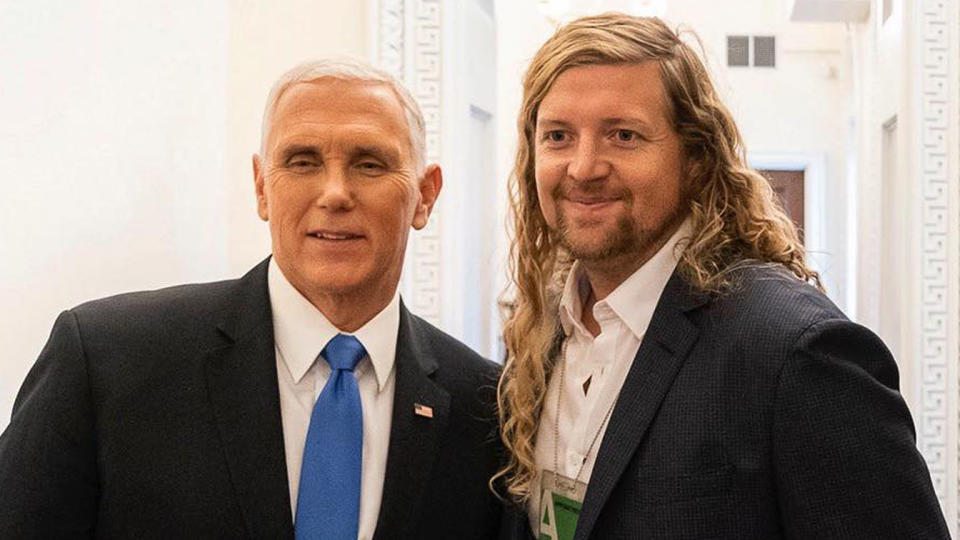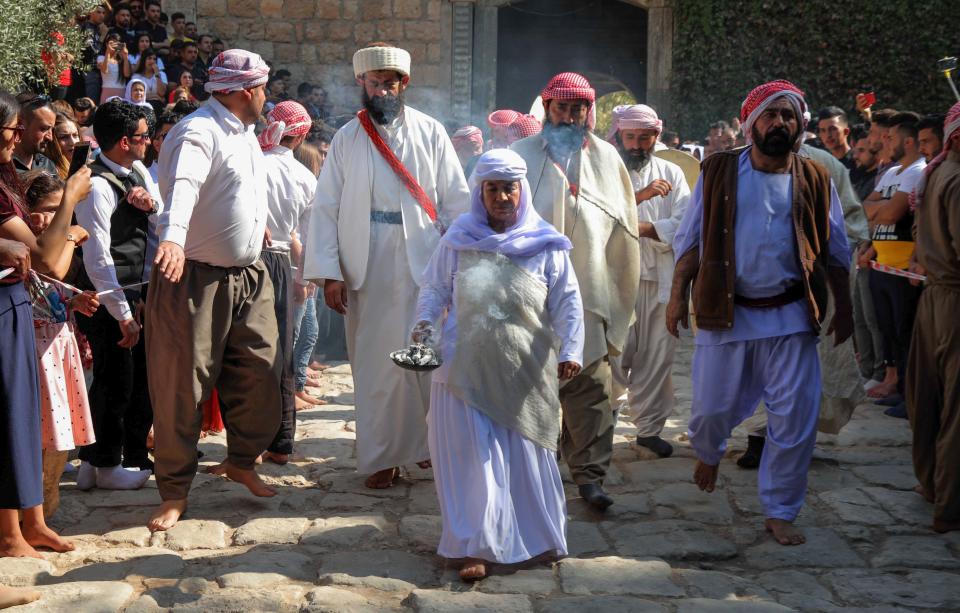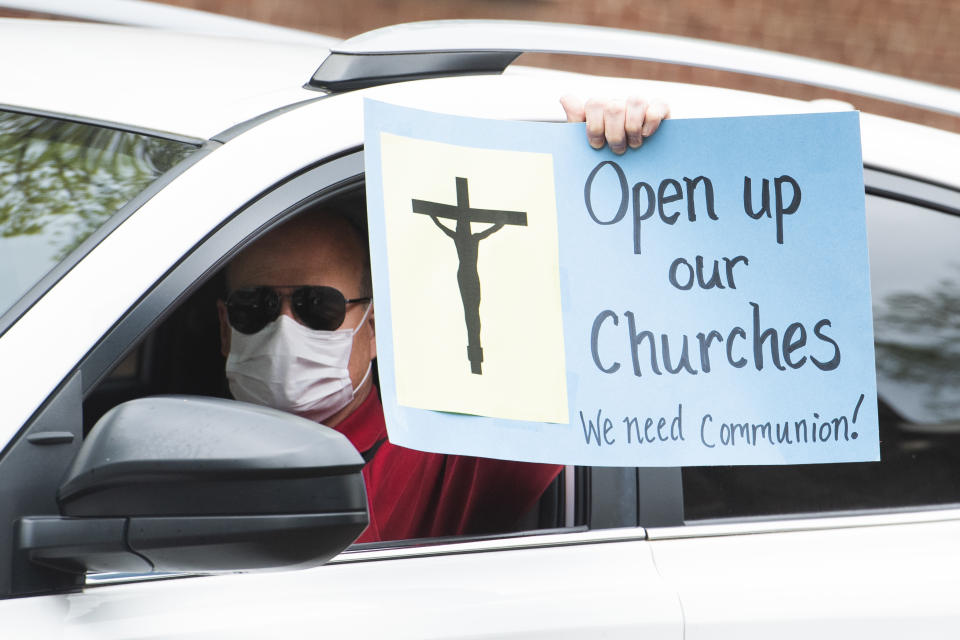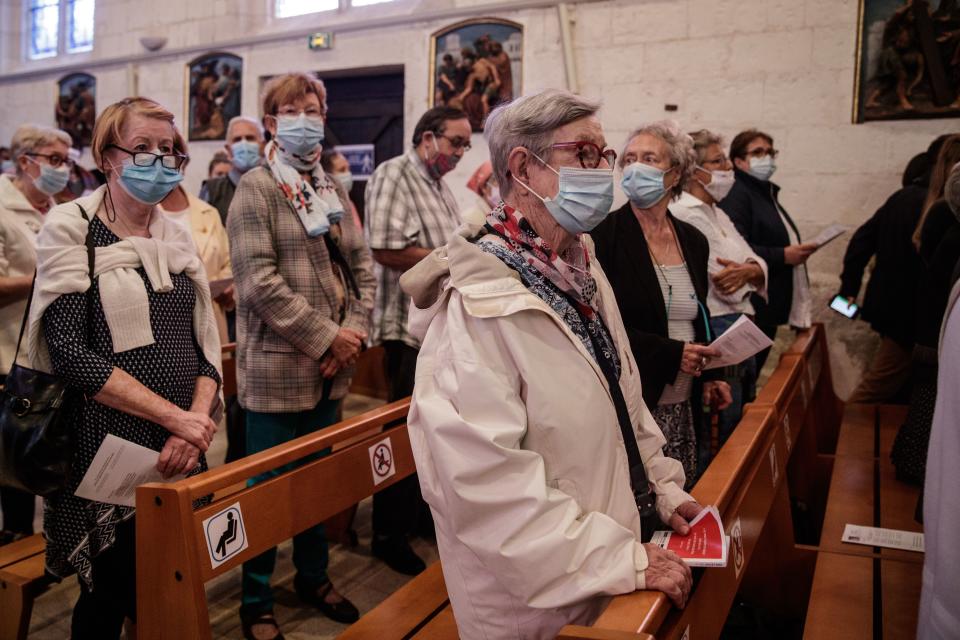Contrasting responses to COVID-19 restrictions highlights split among evangelical Christians
In May, journalist Mindy Belz was frustrated by the way she saw white conservative Christians in America responding to the pandemic.
Belz has written for World Magazine, a North Carolina-based Christian publication, since 1986, when the magazine was founded by her brother-in-law, Joel Belz. She is currently a senior editor at World, and for the last 20 years, she has made regular trips to the Middle East to report on the plight of religious minorities in the region, namely Christians and Yazidis.
She has documented, in highly personal stories that have put her own life in harm’s way, the brutal and violent oppression of Christians and Yazidis by Islamic militants. Her 2016 book, “They Say We Are Infidels: On the Run from ISIS with Persecuted Christians in the Middle East,” recounts in vivid detail how the Christian population in Iraq has gone from around one million people in 2003 to around 100,000 or so now.
“These families are literate, they're professional. They speak three and four languages. These are not necessarily destitute people normally, but they've been made destitute,” Belz said in an interview on “The Long Game,” a Yahoo News podcast. Those who escaped Iraq with their lives “would love to move back to their homes, but there's been no way, a political way as well as just a physical way, for them to do that.”

In May, Belz watched conservative evangelical Christians in America complain about mask-wearing, question the scientific consensus around the pandemic, and hold protests about the initial shutdowns in spring and into early summer, she fired off a tweet: “For 6 [years] I've reported on Christians chased from their homes & churches by ISIS, seen their testimony, steadiness, care for one another. How utterly disheartening to watch the American church come apart in a 10-[week] shutdown. They shall be known by their demand for their rights.”
Belz’s point was partly about perspective, pointing out the true hardships faced by Middle Eastern Christians in comparison to whatever the faithful may endure in the U.S. But perhaps more so, it was about Middle Eastern Christians’ response to persecution and their rallying to the idea of a common good, as opposed to what she saw as the narrow and solipsistic self-interest of their American counterparts.
Conservative evangelicals have long complained of animus against them from secular culture, but during the COVID-19 pandemic those complaints have intensified. Some Christians say they are being actively discriminated against during the outbreak, citing policies in some localities that have been more strict in forbidding religious gatherings than they have been regarding political protests.
This split within the faith — between those like Belz who wish Christians would count their blessings in the U.S. and prioritize the less privileged, and those who believe they are already persecuted in America — predates the pandemic and the Trump presidency but has been exacerbated by both. And these dueling visions strike to the heart of a division inside American Christianity about the role of the faith in the country.
This Sunday, there is a large gathering expected on the National Mall organized by a musician named Sean Feucht, who ran for Congress in 2018 as a Trump-supporting Republican. Feucht has used social-media savvy and a knack for stirring up controversy to draw attention to his events, which have brought crowds of people closely packed together, singing loudly without masks.
Part of Feucht’s message that appeals to conservative Christians is his claim to be standing up against discrimination. “More persecution exists now than any time in human history,” Feucht wrote on Instagram Oct. 14, linking to an op-ed he wrote for the Federalist in which he claimed that “now in major cities across America, godless politicians are adopting tactics that more closely resemble those of jihadist ayatollahs than men and women who are sworn to uphold the rule of law.”

Belz, by contrast, told Yahoo News that her tweet in May was driven by disappointment in the response of many American Christians to COVID-19.
Middle Eastern Christians have endured so much, and yet are “caring not only for one another, but caring for the community that they live in,” Belz said. “They also moved towards Muslims and they moved toward the Yazidis and found ways to care for them too because the government wasn't doing it.
Another Christian leader with vast experience in international work made a similar critique of the American church this week. “Why are so many Christians focused on fighting for their religious rights when Jesus set the ultimate example of laying his rights down for others? It’s not supposed to be about our rights, it’s supposed to be about the welfare of others, especially the poor and oppressed,” wrote Richard Stearns, who was president of World Vision — a Christian humanitarian nonprofit — for 20 years until his 2018 retirement.
Stearns alluded to the fact that those most affected by COVID-19 include “those who are victims of discrimination or too poor to have health insurance ... single moms working two jobs at minimum wage to support their families, refugees fleeing for safety and Dreamers praying not to be deported.”
“Let’s make it about them and their rights,” Stearns wrote.
This critique of American Christians has only been sharpened this year by the national debate over systemic racism and institutionalized injustice. Many have found it ironic that while the most prominent white conservative Christians have said little in support of racial justice, they have cried foul about the relatively minor inconveniences like mask-wearing in the face of the pandemic.

“The disciples, the writers of the Gospels, Paul himself would never be able to conceive of a world or society like America where (mostly White) Christians owned so many businesses, homes, wealth, institutions, and held the highest level positions of power in the government,” wrote Christian author D.L. Mayfield, in her recently released book, “The Myth of the American Dream.”
“We might be seen as the most preposterous of all: the people with power constantly stoking the fear that we will lose it, claiming the blessing of a Savior who urged us to do just that,” Mayfield wrote.
As former New Jersey Gov. Chris Christie wrote about mask-wearing and physical distancing after contracting COVID-19 and falling seriously ill following prolonged close contact with President Trump while not wearing a mask: “These minor inconveniences can save your life, your neighbors and the economy. Seldom has so little been asked for so much benefit.”
Belz acknowledges that there are “legitimate concerns” about the ways that local governments have applied prohibitions on public gatherings unevenly with regards to churches and religious groups.
“There have been some legitimate concerns that churches have been discriminated against in Nevada, for instance, in the way that casinos were allowed to stay open while churches were under these very tight restrictions,” said Belz, also noting concerns about restrictions on churches in California. Her daughter, Emily Belz, is also a journalist with World, and wrote recently about the complaints of Orthodox Jews who have likewise argued that COVID-19 mitigation efforts have infringed on their right to worship.
David French, a conservative author and attorney with a long career defending religious liberty, wrote recently that while shutdowns early in the year were necessary, as the year went on it became more clear to him that “in many jurisdictions, religious liberty was under threat.”
“Churches weren’t sharing the burden equally with other institutions — instead, they were facing greater burdens, even when they diligently offered to accommodate reasonable public health concerns,” French wrote.
But French chastised Christian leaders who “just charged ahead, gathered in-person (often without any social distancing or masking), and either dared the authorities to stop them or challenged the restrictions while simultaneously flouting even scientifically-sound health guidelines.”
“Thus, they became poster children of many of the problems with modern Evangelical political engagement,” French wrote. “Certainly they are attempting to preserve religious freedom, but through a method that disregards the health and well-being not just of the congregants who (voluntarily) assemble, but members of the public who most certainly do not consent to potential superspreading events taking place in their communities.”
Feucht, in response to criticism, has justified his disregard for public health measures by downplaying the risk of COVID, which has now killed over 223,000 people in the U.S. He has also used the fact that Jesus visited and healed the sick to argue that it’s OK for his followers to gather together despite the risk of increasing sickness.
“The church I believe in ministers to the sick and hurting; it doesn’t hide in the darkness. Jesus touched contagious lepers, and our fellow Americans need His healing touch right now,” Feucht wrote.
Not all Christian leaders and organizations have taken a confrontational approach to health ordinances. In Washington, D.C., in fact, Capitol Hill Baptist – a local church – bent over backward to follow public health guidelines and to avoid litigation, and then sought a waiver from the city to be allowed to hold services outdoors, socially distanced, and with masks, before filing a suit against the city. And on October 9, a federal judge ruled in the church’s favor.
But Belz argues that because “Christianity, at its base, is a church for suffering people,” sometimes the faithful can be slow to understand how good they have it, and find it difficult to embrace the idea that they occupy a position of privilege in the U.S.
“I speak for myself, it's very hard to lean into that because the comforts here are so big,” she said.
“And I think that we have created our own ecosystems to major on the comforts, and we're not in a comfortable place right now. And so there's just a lot that people are feeling lost about. I think that it gets to how well-rooted and how well-taught we are.”

Read more from Yahoo News:



